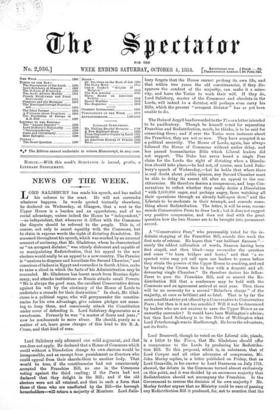The Duke of Argyll has forwarded to the Times a
letter intended to be pacificatory. Though he himself voted for separating Franchise and Redistribution, much, he thinks, is to be said for connecting them ; and if ever the Tories were insincere about the Franchise, they are not so now. They have accepted it as a political necessity. The House of Lords, again, has always followed the House of Commons without undue delay, and has passed humanitarian Bills which Liberal leaders did not support. The Duke has never heard a single Peer claim for the Lords the right of dictating when a Dissolu- tion should take place,—he had not, of course, seen Lord Salis- bury's speech of Wednesday,—but he holds that where there is real doubt about public opinion, any Second Chamber must be able to delay its assent till after an appeal to the con- stituencies. He therefore desires a compromise, and begs Con- servatives to reflect whether they really desire a Dissolution "with 2,000,000 eager, and perhaps angry, faces watching all their operations through an already half-open door," and the Liberals to be moderate in their triumph, and concede some- thing about Redistribution. The letter, it will be seen, recom- mends Conservative Peers to draw back ; but it does not suggest any positive compromise, and does not deal with the great question how the two Houses are to be brought into permanent accord.














































